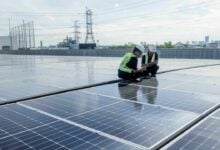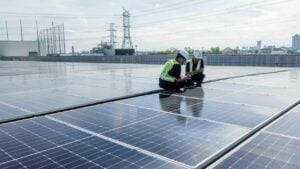How realistic is Bangladesh’s climate prosperity plan?

At the COP26 climate change conference in Glasgow, Bangladeshi Prime Minister Sheikh Hasina called on wealthy nations to fulfill their pledges to cut greenhouse gas emissions and provide the promised $100 billion (€86 billion) annually in financial aid to less wealthy countries to help them adapt to climate change and mitigate further rises in temperature.
Only a tiny fraction of global warming can be attributed to Bangladesh’s carbon emissions, Hasina said.
Bangladesh currently emits around 0.3 tons of carbon dioxide per person per year, compared with about 20 tons per person in developed nations.
Climate Vulnerable Forum (CVF) countries, with a collective population of 1.2 billion people, emit only about 5% of global emissions but are projected to suffer some of the worst impacts of climate change. These countries are at risk of displacement by rising sea levels and severe flooding, cyclones and heat waves.
Bangladesh, for instance, is the seventh-most-affected country when it comes to extreme weather events in the past two decades, according to the Climate Change Vulnerability Index.
“The impact of climate change on countries like Bangladesh is huge,” economist Fahmida Khatun told DW. “It will create environmental havoc in disaster-prone countries.”
Threats to economic development
The most recent Intergovernmental Panel on Climate Change (IPCC) report projects that, if the globe were to warm by 1.5 degrees Celsius (2.7 Fahrenheit) above pre-industrial levels, in coming decades there would be increasing heat waves, longer warm seasons and shorter cold seasons.
If the average global temperatures were to rise by 2 degrees Celsius, heat extremes would more often reach critical tolerance thresholds for agriculture and health, the report found.
“The sixth assessment report of IPCC already shows that the impact is much bigger than it was even thought,” Khatun said.
“It will also reverse the economic growth,” she added. “Economic activities will widely face hindrances, and the impacts on habitation, health or education will be paramount.”
What is the climate prosperity plan?
In her second term as the CVF president, Hasina began talks on shifting from resilience to economic prosperity when it comes to tackling climate change.
Bangladesh expects to double its economy $409 billion by 2031 and become a middle-income country.
In an op-ed published in October in the Financial Times, Hasina called for a “climate prosperity plan” instead of “empty pledges.”
Hasina said Bangladesh was “committed to leading the path to a solution” to fight climate change “not only because we wish to avert the worst of climate change; it also makes economic sense.”
“Investing in zero-carbon growth is the best way to create jobs across the economy and ensure that our nation becomes more prosperous,” she wrote.
Under the plan, Bangladesh intends to obtain 30% of its energy from renewables by the end of the decade.
“We will enhance resilience, grow our economy, create jobs and expand opportunities for our citizens, using action on climate change as the catalyst,” Hasina wrote of the plan.
Path to green technology
The five-theme plan consists of bridging existing plans, a transition toward renewables, creating efficient and greener energy hubs, providing access to global funds and investing in the country’s youth.
Bangladesh’s top officials believe the plan could grow the country’s gross domestic product by as much as 6.8% and create 4.1 million new jobs, and generate one-third of the country’s energy from renewables by 2030.
Hasina said Bangladesh will develop wind farms along its coast to revitalize the mangrove forests that help stabilize shifting shores — also protecting the country against storms and flooding.
“We will empower banks to offer favorable terms to fossil fuel-free infrastructure projects, and pursue co-operation with developed nations in areas such as green hydrogen,” she wrote.
Ahmad Kamruzzaman Majumder, a Bangladeshi environmentalist, told DW that there will be a strong emphasis on the transfer of technology using green financing in the country.
“Bangladesh wants to take the economic opportunity climate change has created,” Majumder said from Glasgow.
Economist Fahmida Khatun also told said Bangladesh will focus on green technology in the coming decades.
“From agriculture to industry or from energy production to reducing carbon emission, the implementation of efficient and greener technology will be the key for development,” she said. “But Bangladesh will need a huge investment.”
Bangladesh hopes that more developing nations will adopt such plans in coming years, led by members of the Climate Vulnerable Forum.
Diversification, transparency and accountability
Bangladesh currently spends about $2 billion (€1.7 billion) annually on climate change-related adaptation measures, with 75% of the money coming from domestic sources. The country would need almost three times that amount as adaptation finance by 2050 to achieve its climate goals.
“First of all, access to the climate fund promised by the developed countries is already a tough job. It is slow, bureaucratic and jolted with other development funds,” Khatun said.
“Of the amount they have come up with, more than 60% of that is for mitigation measures, which is their way of fighting climate change. But, for countries like Bangladesh, more funds are needed for adaptation,” she added.
CVF countries have demanded that the fund should allocate 50% of its resources for mitigation and the rest for adaptation measures.
“The source of money should be diversified,” Khatun said. “Private sectors should also invest in green technology. For that, Bangladesh needs to create a business-friendly atmosphere.”
Transparency and efficiency in the implementation of the prosperity plan might also pose challenges for Bangladesh, Khatun said.
“Bangladesh has to ensure accountability and transparency while dealing with funds,” she said. “They will also need quality human resources who are capable of dealing with new technologies.”
SOURCE: DW News
Latest Thailand News
Follow The Thaiger on Google News:
































